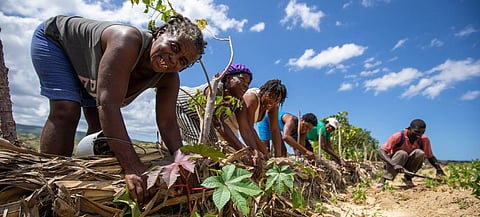
- NEWS
- the EDIT
- COMMENTARY
- BUSINESS
- LIFE
- SHOW
- ACTION
- GLOBAL GOALS
- SNAPS
- DYARYO TIRADA
- MORE

A recent global forum highlighting the United Nation's Decade of Family Farming got underway, aimed at identifying priority policies to boost support for family farmers and agricultural development worldwide.
The UNDFF runs through the end of 2028, and the forum is being convened by the UN Food and Agriculture Organization and the International Fund for Agricultural Development.
FAO director-general Qu Dongyu pointed out in his video address to the global forum's opening that the world is moving backwards in its efforts to eliminate hunger and malnutrition.
Growing hunger
He said the number of people facing hunger increased in 2021, and it risks rising further, especially among the most vulnerable, of which almost 80 percent live in rural areas and are small-scale family farmers.
Family farmers around the world are also subject to the new challenges to food systems everywhere, created by the climate crisis, as well as conflict.
The war in Ukraine has added further pressure to already fragile agrifood systems, UN agencies said.
Qu said the forum provides a way, firstly, to discuss "the unique role of family farmers in transforming our agrifood systems; two, take stock of achievements and challenges in the implementation of the UN Decade; and three, strengthen collaboration to ensure global food security, enhance livelihoods and achieve the Sustainable Development Goals."
80 percent
"Family farmers need to be at the center of efforts to transform agrifood systems if we are to make real progress toward ending hunger," Qu added.
He said that "family farming is the main form of agriculture in both developed and developing countries and is responsible for producing 80 percent of the world›s food" in terms of value.
